In this Travelling to Morocco by Motorhome post, we take an in-depth look at everything to do with bringing your motorhome to and touring around this fascinating north African country. We focus on what you need to do before you come and how to arrive smoothly in Morocco by Motorhome. There are a lot of reports about where to sail from, and whilst everyone’s experiences are, for sure, valid and personal, we wanted to share our practical tips based on our two journeys in February 2020 and January 2023. Our aim is to quell those raging doubts and fears and give you both the knowledge and confidence to make this epic journey to Morocco by motorhome.
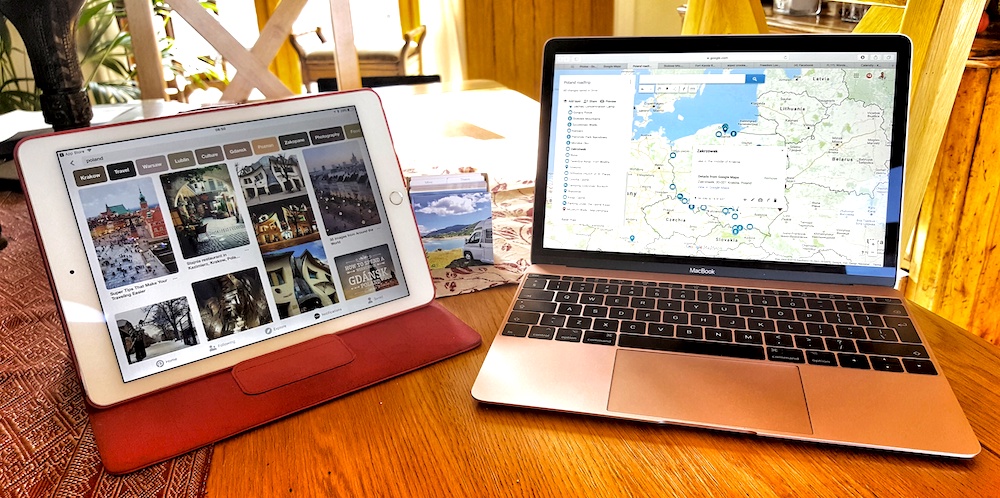
,
Part 1. What to do before travelling to Morocco by Motorhome
Whilst you may be like us and enjoy winging it – there are some destinations that really need some fore-thought. Morocco is one of them and Norway another. For Morocco, plenty of preparation is required. In part because it’s a different continent and the requirements are different to a majority of Europe. And also because, for many Moroccan newbies, it has a feel of taking us out of our comfort zone. Travelling with huge anxiety is not a great mix and so we must do some homework to make sure that our experiences are positive and fulfilling and not fear-making.
We hope that this section might allay some apprehension as you begin to dream and think about taking your motorhome to Morocco.
1. Check out your Insurance and Breakdown cover – Green Card
Travelling to Morocco by motorhome has become a little more tricky, from an insurance point of view, as it has been withdrawn from many UK motorhome insurance policies – European firms may be different. So your first step is to enquire about your particular company’s terms and conditions. If they do allow for you to travel to Morocco in your motorhome, then you need to ask for a Green Card which gives you Fully Comprehensive cover during your stay in the country. You will though need to give them specific dates of travel.
If like our insurers Comfort, they no longer cover Morocco even with a Green Card, then don’t give up. There are a couple of options. First speak to Sterling Insurers (formerly HIC). After much research and speaking to BIBA the Insurance Broker body, we managed to get a quote for temporary, Comprehensive cover for Morocco. This is, superficially excellent news and a game changer for many, although get ready for the eye watering price; between £750-970 for between 2-3 months. Now that quote was based on our van’s age and circumstances, so your quote might be more or less or perhaps even they won’t cover you at all. Although it is worth a conversation with them.
The second option is picking up 3rd Party Insurance at the Port in Tangier Med. We paid €200 (payable in cash I hasten to add) for three month’s cover. Whether it will be worth the paper it is written on, we hope we don’t need to find out. We realise that many would not want to risk a 3rd party cover, although having been to Morocco before, we weighed up the risks and decided it would be worth it.
We also do not have any Breakdown cover, as given our insurance is covered by Comfort, and they no longer cover Morocco, we must rely on local breakdown. That said even when they did provide cover, Comfort’s European Breakdown with DAS wasn’t covered in Morocco anyway. So we still would have been reliant on a local breakdown recovery service. It is worth mentioning that the Moroccans are super helpful and skilled and a quick call to the local town mechanic will get you recovered and repaired.
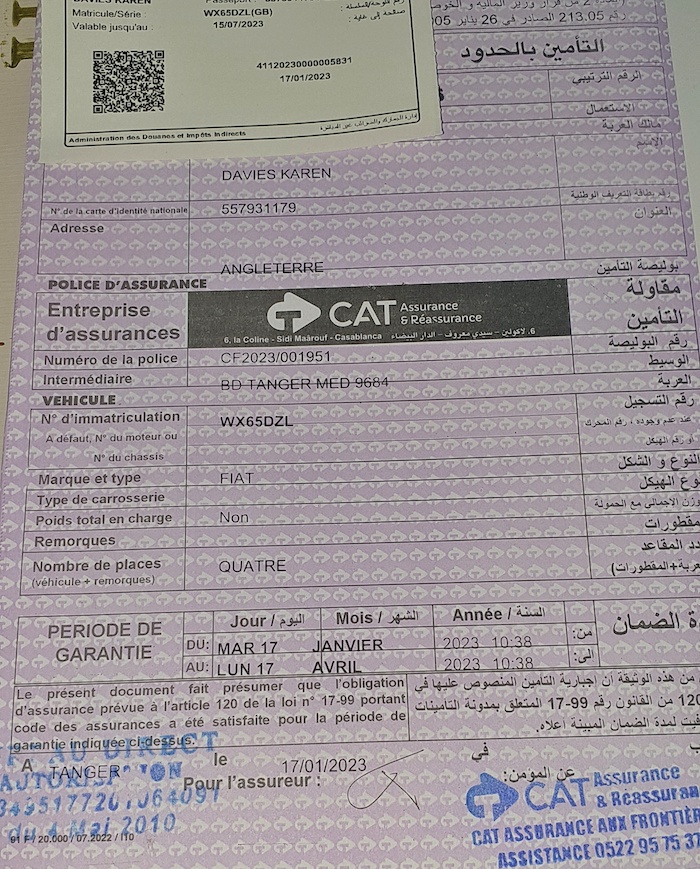
2. Check your Travel/Health Insurance
If you already have Travel Insurance, then check that Morocco is covered, because whether you are travelling in the Brexit transition or not, the EHIC card is not useable here. As we travel full-time, we needed to secure our cover whilst out of our home country, and most UK companies will not therefore instigate cover. So we sought the best deal from those that will cover you whilst you are already travelling. The quote ranged from £113.20 to £355.80 for two people without and pre-existing conditions. We chose True Traveller as they had the lowest quote for us for our one month road-trip. Make sure you choose the European Cover and not Worldwide, as Morocco is covered under the EU countries. The other insurer options are:
World Nomads True Traveller Worldwide Insurance
3. Internet/Apps/Telephones
Talk to your telephone supplier as their coverage and packages don’t cover Morocco and you will be charged crazy prices for calls and data, as it comes under International Rates. You will need to buy a Moroccan SIM card for calls and data, so you will need them to unlock your phone (you can do this online with most companies). Whilst some campsites have wifi, it’s not always great, like anywhere and whilst you are out travelling, you will want to have connectivity.
Our advice is to make sure you have off-line versions of the apps you use most often. Before you leave Spain for Morocco, make sure you have downloaded all the Moroccan maps for your maps.me app, if you have it. Also we use Park4Night for wild camping and so bought the off-line version for £8.42 per year, and the Search for Sites app for campsites for £5.99 per year.
4. Documentation to take with you
Like with travel to most countries, you will need:
- Passports and copies in case you loose them
- V5 – in Morocco this is known as the Carte de Gris – the grey card
- Your MOT certificate as it is reported that sometimes Police wish to check this
- Hard copies of your Travel/Health Insurance and your Vehicle Insurance
- There is some debate about whether you do need an IDP. Some websites we read said yes others no. So to be on the safe side we arranged to have ours updated. Piece of mind!
- Your Green Card (if your Insurers provide one.)
5. Plans for maximising your LPG
Morocco doesn’t have any LPG, so you will need to judge the use of gas carefully, especially if you are coming for over a month or more. So think about options for conserving your gas. Obviously campsites will give you access to EHU. Although they are not always powerful enough to give you enough wattage for your fridge to stay on. Although from a cooking perspective and for the limited options for wild camping, then may be you will need to look at other gas saving approaches. You can buy Moroccan gas bottles and simply buy a Tandor, which is their regulator and add this to your outside gas point. We have one at the ready if it becomes necessary.
Additionally, we invested in a few electrical items. The first was a Remoska which is a fabulous electric oven that cooks pretty much anything, in about an hour, just like a normal oven. It even works off the inverter whilst you are driving and is a great gas saving resource.
We also have a two-plate electric stove (and a back up in case it fails). You can buy them from Argos in the UK and El Cortes Inglés in Spain. We also purchased a low-wattage slow cooker, so we have a lot of options available to us to converse our precious gas.
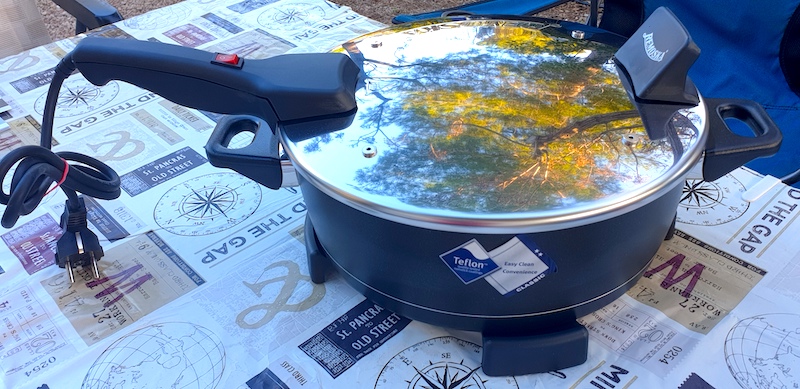
6. Maps/Reference books
There’s a ton of blogs out there about Morocco from motorhomers and overlanders. Some you buy and some are free on the web. It’s definitely worth researching and having a read. We bought the book by Chris Scott called Morocco Overland, which offers lots of off-road tips if you are travelling with a 4×4, which also has great info on how to travel to Morocco by motorhome. Whist the latest edition is 2017 and some of his information is out of date, there’s a load of really helpful tips in there.
One of which is to buy paper maps of Morocco. Given that whilst travelling in Morocco you need to buy a data SIM to stay connected to internet that apps like Google Maps feed off, hard copies can be essential. So we bought two maps based on recommendations; the Reise Know-How 1:1 Mill and the Michelin Map.
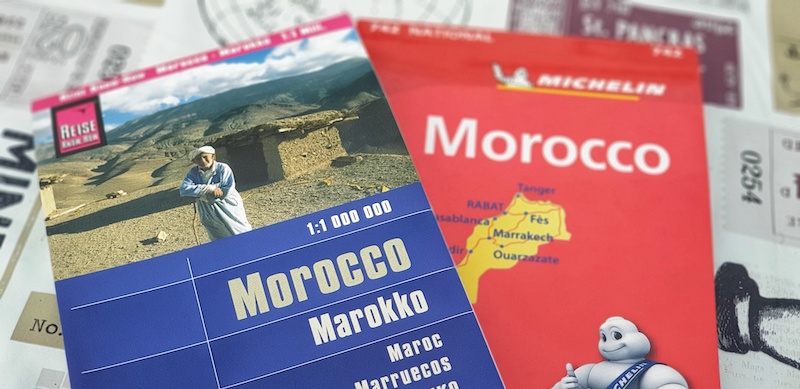
7. Stuff to take with you when travelling to Morocco in a motorhome
In terms of stock-piling before you go, unlike our trip to Norway, Morocco doesn’t have the same price issue. Although these are the items we did buy;
- The wine we like in boxes for easy storage
- Some pork and lamb for the freezer if you are meat lovers
- A few tins of staples that create the meals we enjoy that you may not be able to get in regions of the country without large supermarkets.
- Crisps and nibbly bits are expensive so have plenty of these, if they are your thing.
- Hand Sanitiser to keep carry around with you for their public toilets
- A shawl for me walking through towns or mosques for the few that allow women to enter and there aren’t many
- Some long sleeved shirts and a head scarf to ensure my attire was appropriate for visiting towns
- Two tyre repair canisters in case of a puncture. Although we would recommend you investing in TyrePal or a similar notification system that gauges the pressure of your tyres and advises you of potential punctures or deflating issues.
And a final point – DO NOT TAKE YOUR DRONE WITH YOU. Either leave it at home or leave it with someone you trust as they are illegal in Morocco and if you van is search and your DRONE found it will be confiscated. We stored ours, thanks to some detective work of our convoy buddy with Central Box in Algeciras. For €27.95 per calendar month we secured a 1m x 1m storage unit that took my SUP and our Drone.
Part 2 – Travelling to Morocco by Motorhome
So armed with the results of all your research, you are now ready for the exciting bit – the travelling to Morocco. In this section we offer you a detailed and step-by-step account of the whole ferry and Custom’s procedure. I am driven to write this because of the plethora of reports out there and to share exactly what happens when you leave Spain and arrive in Tangier Med (as of 17 January 2023). So much of my EXCITYSCARED feelings were because of some of the horror stories we had heard about getting through Customs and what was to be expected. Now I have been through it twice, I felt it was really important to share how it was for us and give you top tips for navigating it smoothly.
1. Choosing which port to sail from
There are plenty of Spanish ports to sail to Morocco from along the south coast – you can even choose to go from Sète in southern France, Italy or Barcelona. As long as you are prepared for very long sailings of up to 60 hours. For the purposes of this blog, let’s stick with Spanish ports for ease;
- Barcelona to Tangier Med; offers two ferry companies and up to 5 sailings per week and is up to 32 hrs sailing time
- Almería to Nador or Melilla; offers 7 sailings a week to Nador & 8 weekly sailings to Melilla taking around 5-7 hrs
- Motril to Nador, Tangier Med or Melilla; for Nador there are 4 sailings per week, Melilla 6 sailings per week lasting aound 4-5 hrs and Tangier Med 7 times per week and is up to 8hrs
- Malaga to Melilla; offers 14 per week sailings of between 4-6.30 hrs. You can also go to Tangier Med although only once a week
- Algeciras to Cueta and Tangier Med, offering 8 sailings per day and is about a 90 minute crossing.
Nador and Melilla are smaller ports that encounter less traffic and so their Custom’s processes tend to be swifter, according to Morocco lover and author Chris Scott. And Tangier City has the reputation for being a nightmare as you have to drive through the city. And Cueta is a Spanish enclave so you have to drive a mile or so before hitting the Customs areas.
Algeciras to Tangier Med is the most popular crossing route and this was the one we chose. We stayed overnight just across from the port in a free car park, joined by four other vans. You may be approached by a man who says you can pay some money, although he is not an official car park attendant and whatever money you give lines only his pocket – you are not obliged to pay anything.
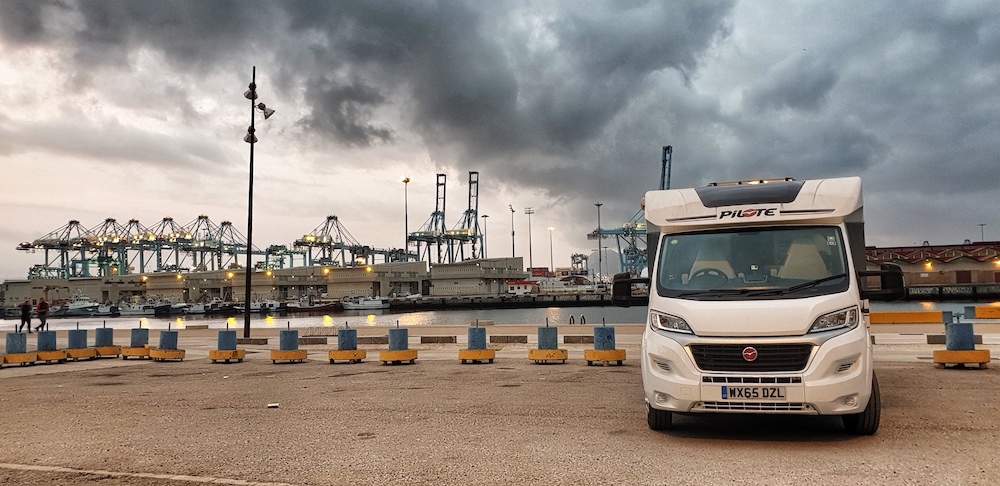
2. Buying your ferry tickets
There are plenty of Ticket Kiosks around the city, although the one that is pretty well famous these days is Carlos from Agencie de Viajes on the Zone Commercial, just a mile out of Algeciras city. The coordinates for the Agency are (36.17932 -5.44126). Old man Carlos is the owner of the agency who still works in there. Well I say work, he generally creates chaos for his daughters who run the show.
You must travel to Carlos and buy the tickets face to face, there is no online facility with their agency and they are significantly cheaper than on line ferry companies. You can park your van in Carrefour’s car park just across the road or in the street opposite the agency. Please bear in mind that Monday seems to be their busiest day. We had to queue out of the door for our second trip to Carlos, on a Monday. His agency is perfectly placed for last minute shopping with Carrefour and Lidl within walking distance and you are about 15 minutes driving time to the port.
Finally Carlos has brought his company into the 21st century and now you can pay by credit card. Although if you want to buy some Dirhams, which we suggest, then you must pay for these by cash. You are now only offered one ferry firm to sail with which is AML and based on our second trip experience they are far superior vessels to the FRS and Transmediterranea. AML offer six crossings 0230, 0630, 1030, 1430, 1830 and 2230. Our sailing in 2023 was €310 for a 7.5m motorhome and 2 adults. This has gone up from the 200€ we paid in 2020.
When you go to Carlos, you will need your V5 and passports and money, of course. Then you leave with your open ticket voucher, Immigration Entry Card and a free gift of wine and biscuits. And that’s it – all done in under 45 minutes depending on the day you arrive at Carlos.
Top Tips for your tickets
1. Take the early sailing – 0630. Given the reputation for ferry delays and Customs Checks in Tangier Med, we chose the early morning sailing on both visits to Morocco. Our thinking was, get on the first ferry and there will be no impact for backlog from previous ferry delays. Also when arriving in Morocco, there’s only one boat load of vehicles to deal with, so the process should be more efficient. You also guarantee landing in Morocco just about in the light, which if this is your first time and you have any apprehension, is sensible.
2. You don’t book a specific sailing. You receive a printed token and take it with you to the Check-in, at least one hour before your desired ferry departure. If the boat’s capacity has been reached you will be put on the next departing ferry. Although if you take the ‘red eye’ ferry as we did in 2023 at 0630 there will be very little traffic. There were just 100 vehicles and only five motorhomes.
3. Take enough cash to exchange into Dirhams. Carlos does have cash to exchange and it seems that now there is no limit to what you can buy. We bought just €100 of Dirham with a rate of €1=10MAD.
4. Don’t worry about not speaking Spanish. The admin team speak French and English, although old man ‘Carlos’ – the god of Morocco tickets – does not. Hand signals worked pretty well. He doesn’t work behind the desk though so don’t worry – his admin team area great.
5. Complete your Immigration Entry Card before boarding the ferry. This will save you time and stress when queuing up to get your passport stamped. Completion notes are in the next section.
6. Keep all your documents and tickets together. I know it might sound a patronising tip, although in the stress that inevitably comes with ferry embarkation, arriving in a new country and not knowing what is expected, having everything in one envelope keeps your sanity in check. And I talk from experience and Myles will back me up for sure.
7. If you are travelling with pets, please ensure that get an Animal Health Certificate valid for only 24 hours from a local vet. It will cost you around €110. This is on top of your required Certificate from your animal’s Titre test. For clarity over the pet situation, one of our Chat Room team went to the horse’s mouth and got a definitive response. This is the transcript. Hope it might help.


3. Completing your Immigration Card
Whilst I may risk insulting your intelligence, I do want to go through the completion of the Immigration Form that you will receive from ‘Carlos’. I know it sounds ridiculous, although I spent a bit of time working out and researching all the categories I had to fill in. And because I didn’t want to risk getting it wrong and causing unnecessary delays, making sure the details were right felt important. So to save you that stress, here are sections and their interpretation.
- C.I.N This is a National Identity Card number and only needs completing if you have been to Morocco before and had your Passport stamped. You will find this number on the stamp, written in ink. If this is your first time to Morocco, then leave this blank.
- Composteur No. This is some sort of validation number and we left this blank and it caused no issues.
- Nom. Your Surname goes here.
- Prenom. Your first name.
- Nom de Jeune Fille. This is your maiden name ladies.
- Date et Lieu de Naissance. Date and place of Birth as in your Passport.
- Nationalite. Nationality goes here.
- Pays de Residence Habituelle. Put your country of normal residence here, ie where you live most of the time.
- Profession. Your job or retired.
- Passeport No. Passport number here.
- Date de Delivrance. This is your Passport Issue Date.
- Provenance. Where you are travelling from – so the Spanish or French port you are sailing from to Morocco.
- Destination. The Moroccan port you are sailing in to.
- Adresse au Maroc. Give the address of the first campsite you will be staying at or something like Hotel Fez.
- Motif Principal du Voyage. What is the reason for your visit to Morocco? So holiday will do fine.
If you make a mistake on the forms that you get on the boat, you can get blank ones and try again.
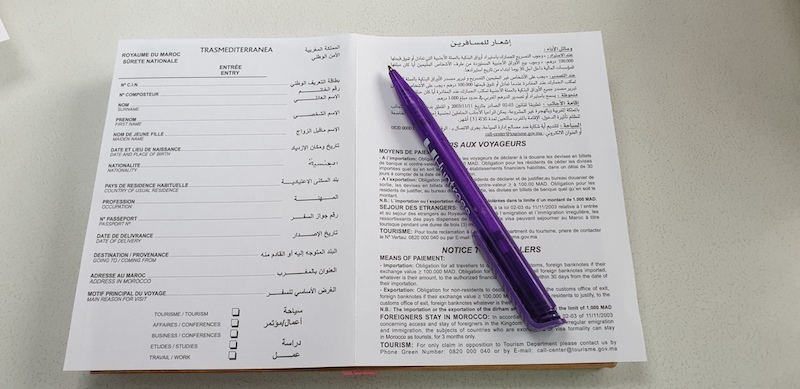
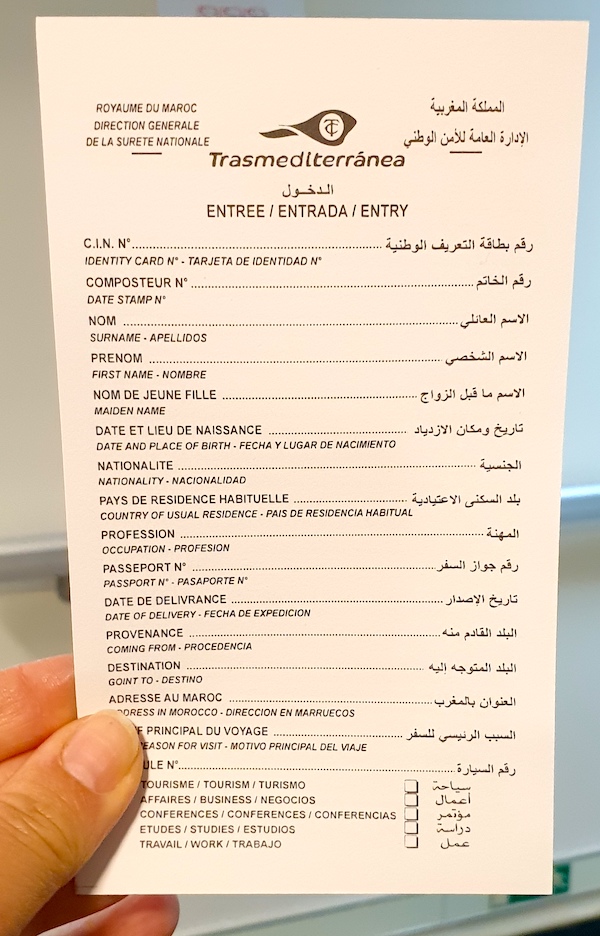
4. Boarding the ferry
We recommend getting to the ferry at least 90 minutes before the ferry is due to depart. This way you can be sure to get your chosen sailing. Follow the signs for Puerto through Algeciras and then at the port, the signposts for Tangier Med. You will then take these steps for boarding your ferry.
- Check-in 1. We passed through with an empty kiosk.
- Check-in 2. Hand over your token from ‘Carlos’ and your Passports. You will be guided to park up in a line. You will then be visited by a Port employee who will want your ticket voucher and passports. They take these away to their check-in office at the Kiosk. Be here for at least one hour before the ferry sails.
- Check-in 3. Then you drive up to the Kiosk where you get your passports returned and receive a Boarding Pass per passenger and for the vehicle. You then proceed to another parking lane. You then head for the embarkation parking, and await the boarding sign.
- Embarkation. Chances are that you will go up to the top deck, which means if you have a big bottom like Scoobie, it might be a very tight clearance. We did scrape on the way down, although nothing major thankfully.
- Park where indicated and turn off your gas.
The whole process was very simple and we only left 30 minutes late, which given the reports from others, was nothing at all. As soon as the ferry sets sail, the Passport Control desk on board will open and you can hand over your passports and Immigration Form. Each boat will probably have a different location, although it is likely to be by the cafe area. You will now be in possession of a mighty fine stamp in the back of your Passport.
Our AML ferry was amazing and so much better than in 2020. It had a cafe and restaurant with Duty Free available as well. It is only a 90 minute crossing so before you know it you are there. The toilets were basic although clean enough with paper.
In terms of the question over whether dogs are allowed on board – we found nothing definitive. On our previous trip we saw plenty of French travellers on board with dogs and this year no signs saying No Dogs allowed.
5. Disembarking the ferry and getting through Customs
Now this is the bit that I think, in all reality, I was dreading the most. That moment in time where the horror stories of chaos, money-greedy touts and stress would ensue. So I was prepared and mindful of what could happen next. Although I was also keen to see how the process worked in practice given all that I had read. So here is the most up-to-date information about how the disembarkation from Tangier Med looks like (based on February 2020 arrival.)
- Getting off the ferry. This did take a while as it does often with all ferries, so nothing major to report here. Even our low-slung rear made it off the boat without incident. So far so good.
- Passport Check. We were guided by an official to have our Passports checked, which he gave a rudimentary check for the stamp on the back page and he waved us off. Still doing well.
- A long drive to Customs. You then, most disconcertedly follow the EXIT signs for what seems like ages. It feels like you are heading out of the port and it left me wondering if we missed something. We finally saw the signs for the D16. We headed for the lane marked ‘Our vehicle is not registered in Morocco‘ and waited.
- D16 – Vehicle Import and Export form. This is the vital piece of paper you need to show that you and your vehicle will be leaving the country. This cannot be done on line. The Customs’ Police do it all for you. So sit tight until you are asked to drive to a holding area. Within 15 minutes we had a visit from a Custom Guard who asked if we had anything to declare – such as a Drone. You are not allowed into Morocco with one. So either store it in Spain or you must declare it. Then he took our V5 (Carte de Gris) and Passport were collected and taken to the Kiosk. The D16 is a small Credit Card sized card that you must keep safely as you will be asked for it on your return journey. It’s good to see that things have progressed with these official procedures.
- Another Border Control Check. Once D16 and Passport are firmly back in your grasp, you have a visit by sniffer dogs and they ask to check your Garage for drugs and weapons. Then it is wagons roll. Well as far as 100m where there is another Border Control Check. That takes seconds and you are on your way.
- Money and Insurance. The final step in the process is to drive a further 100m where there are some cabins on your left-hand side. Here you buy your 3rd Party Insurance if you don’t already have your Green Card and exchange your money. There are lots of cabins to choose from although they are not all occupied. So I chose the one that had a name I recognised. They are all kosher and there are no touts milling around putting on the pressure. The attendants speak English too, so if your French is minimal, then you don’t need to worry. They give you a receipt for your money and that’s that! You are good to go. I strongly recommend that you do the money exchange, because if you head off south on the A4 motorway, it is a Toll Road and you will need cash to pay. The Insurance Kiosk at the far end also sells Maroc Telecom Sim cards, although the deal is not as good as in a Maroc Telecom shop.
So our verdict of the Customs’ process? Easy as anything and nothing to worry about at all. From getting off the boat to hitting the road having got our D16 and our money was a mere 90 minutes. So my ‘catch the early ferry’ strategy seemed to work really well and I highly recommend it, to keep you and your family sane.
Part 3 – Leaving Morocco
Whilst travelling to Morocco in a motorhome is now a piece of cake, what about the exit? We thought it would be worth a quick mention as we’re talking about the process of arriving into Morocco, to share our experiences having just left. All in the spirit of preparation, knowledge and confidence, it feels important to take you through the steps for leaving the country.
1. Staying somewhere safe overnight
Depending on the ferry you have decided to catch for your return will partly dictate where you stay. Somewhere close to the port would be sensible if you are on the ‘red-eye’ 0830 with Transmediterranea. Although there don’t seem to be many options. There is a public parking area which is guarded by staff that some people have reported staying at (35.884201 -5.50203) although it depends how comfortable you are with staying so close to the port. We decided to stay at a wonderful wild spot that was just 45 minutes drive and chose the 1100 ferry. Given the advice we received numerous times about not driving in Morocco at night, taking the ‘red-eye’ was not an option. So this was the perfect place to be. We left at 0800 and were having breakfast in the queue at the docks by 0920 having gone through Customs. More on this in a moment.
Our overnight was lovely, overlooking Erraouz Reservoir. It’s on one of Morocco’s Provincial roads, which means that it varies in quality from a bit bumpy to good quality tarmac. It was one of the lesser quality roads we had driven on, although none the less very doable, just slowly. Here are the coords. (35.713367 -5.52351). It is a peaceful spot with herds of goats and sheep passing through from the village directly above you and there were four of us staying there, without any issues from the locals.
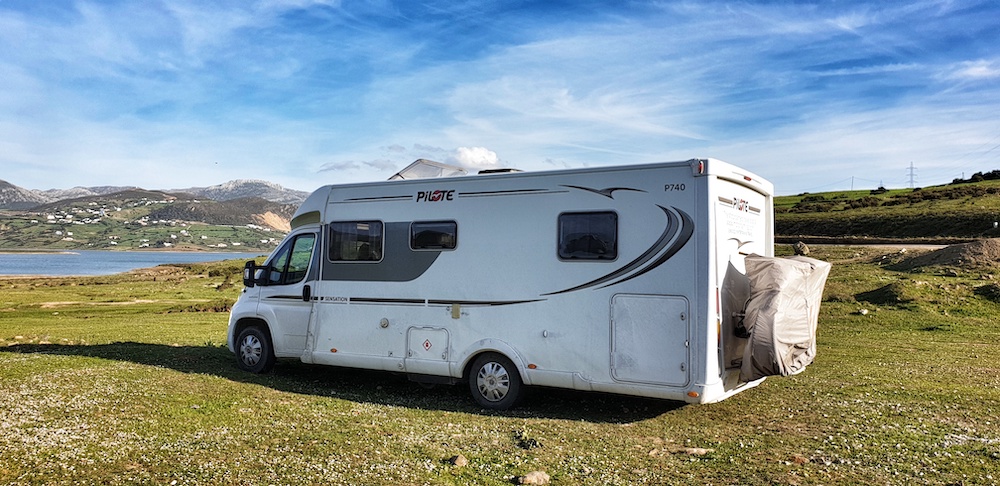
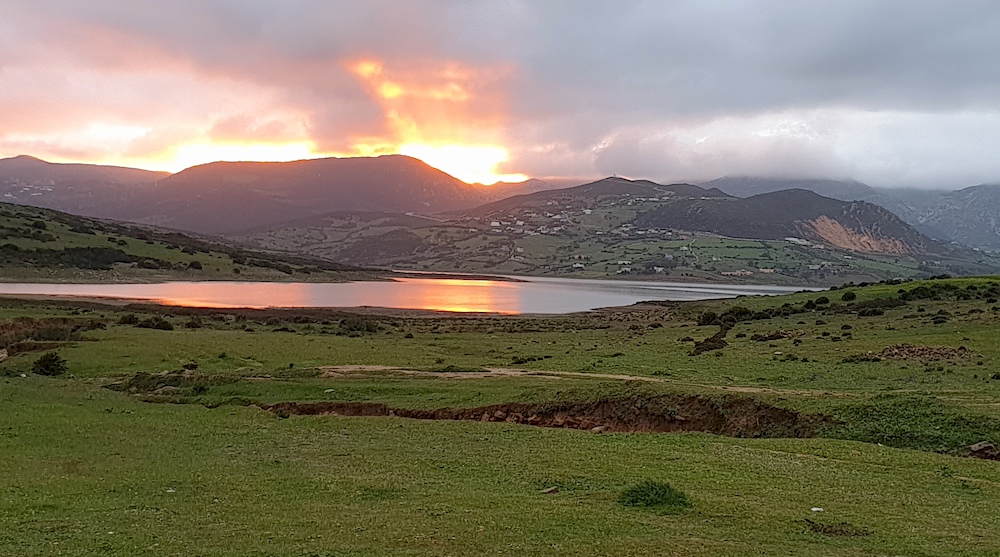
2. Arriving at the port
The port is as easy to arrive into as it is to leave. Whether you come in on the back roads or the motorway, just follow the signs for Automobile Access. You will pass all the cabins where you may have picked up your money on the way out and be guided to park up. This is so that you can validate your Ferry Token that you received from Carlos’ Agency. You will get an open ticket, then you can choose the time you wish to depart. Get there earlier enough and it should be no problem at all.
Take your Passports and your ticket, and in return you will receive a triplicate ferry ticket for the next available ferry.
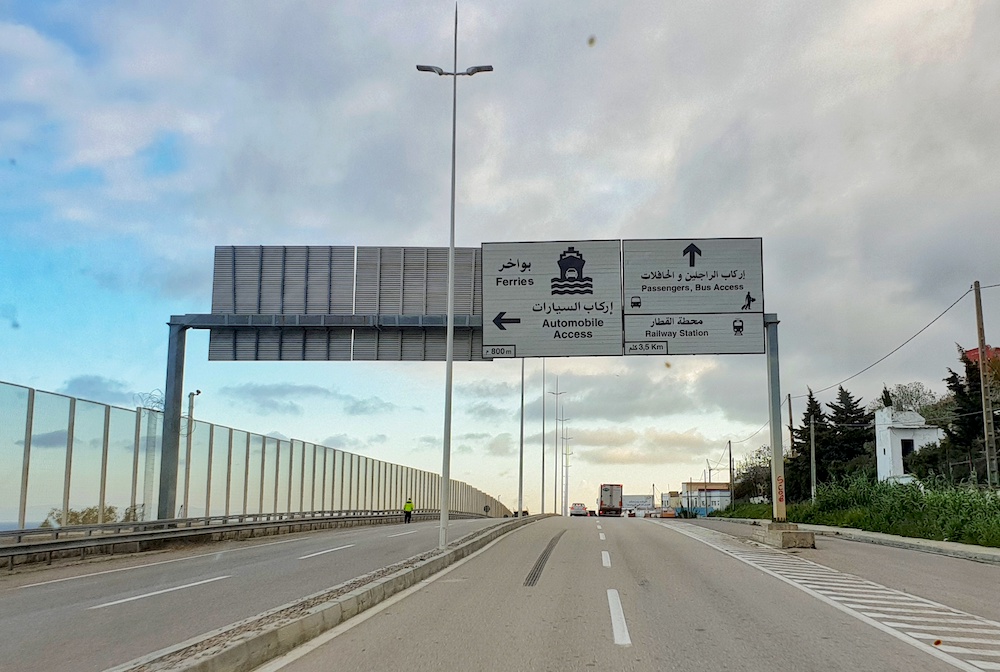
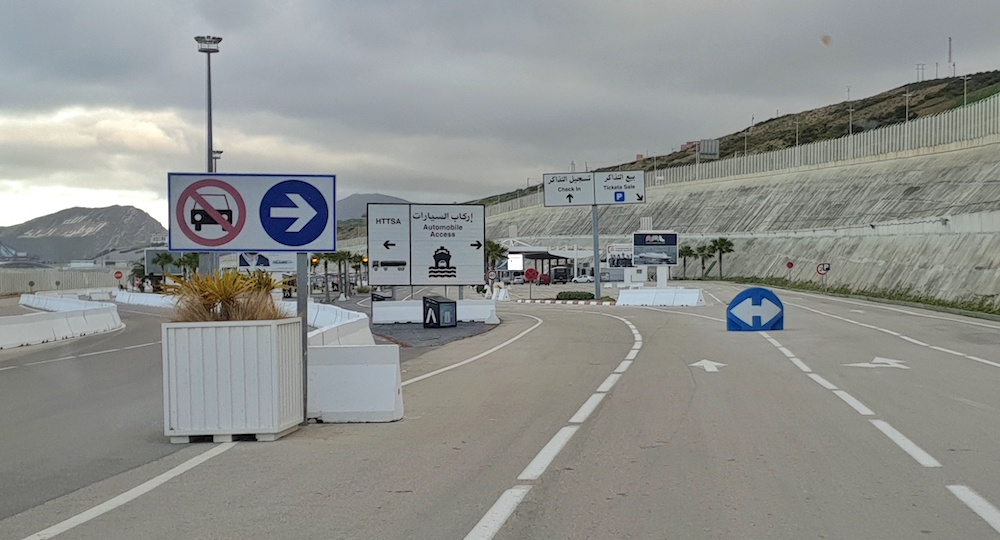
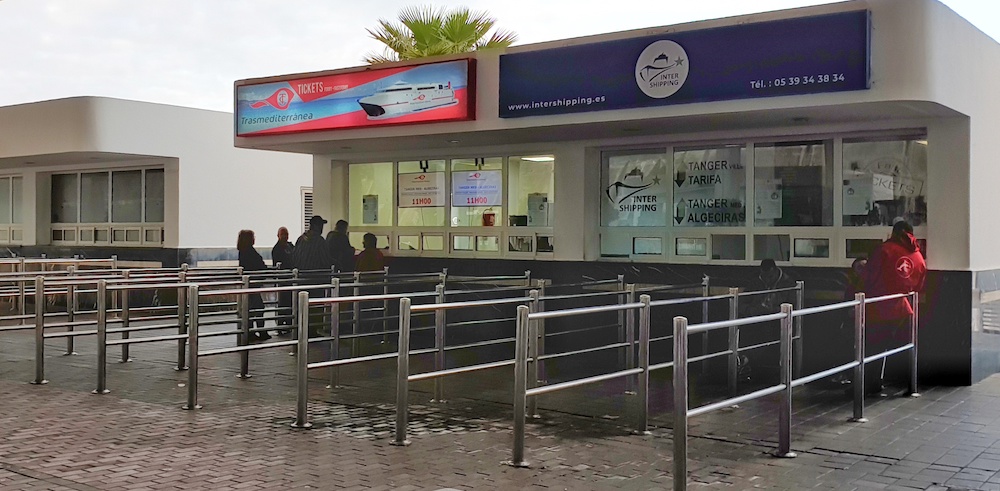
3. Going through Customs
After the ease of arriving through Customs four weeks earlier, we wondered whether the process would be as simple on our return. After validating your token and receiving your ticket, you have four stages to go through;
- As you leave the Ticket Validation car park, an Official will examine your ticket and wave you on.
- You then arrive at the first of the Customs’ Checks. They will check your Passports and give you a stamp to say that you have exited the country.
- You then move forward 100yards to the next Kiosk where they ask for your D16 – the small business sized card you received on arrival. They stamp this saying that you are officially exporting your vehicle.
- Then you drive a mile up to the X-ray machine. Two vehicles at a time drive on the examination platform and you are asked to exit the vehicle. They are searching for drugs and arms! Whilst we were there a converted, rally Renault who came through the day before had been impounded for carrying 52kg of Hashish. That’ll not be a pleasant extension to their holiday I’m sure. After a couple of minutes you are allowed back on your vehicle and you exit the platform. Then you take another short journey to find the departure gate for your chosen ferry carrier and park up and wait. That’s it.
All of that took us just 30 minutes from arrival to parking up. So make sure you allow yourself enough time to go through that procedure for your chosen ferry.


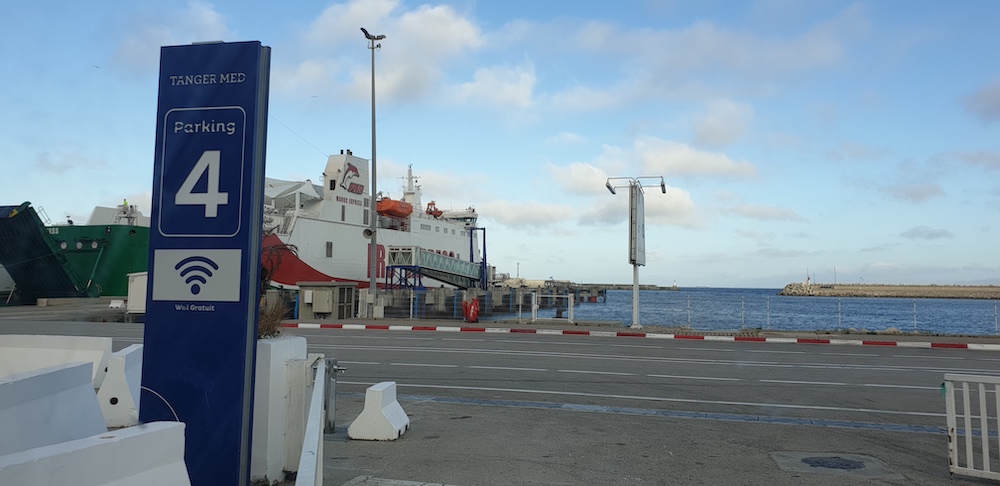
3. Getting on the Ferry
Just a word of caution. If they send you up on the top deck of the ferry, if you have a large overhang, as we do then you are likely to scrape at the back. They will however give you ramps that will lift your rear end enough to clear it.
Once parked up chill out and wait for your passage to be completed, reflecting on your memories of your African Adventure. Just bear in mind that the boat only accepts Euros and not Moroccan Dirhams.
Conclusion
So there we have it, in a rather large nutshell. Travelling to Morocco in a motorhome is far easy than we imagine. Armed with plans, preparation and some conflicting information, I am pleased to report that it all went incredibly smoothly. I’m sure on another day it could have been different, although I am convinced that taking that first crossing made a huge difference to our whole experience. So I hope this detail helps you, if you are thinking about travelling to Morocco by motorhome or are about to do it imminently. As always, if you have any questions just drop us an email at themotoroaming@gmail.com. If you would like to check our our live videos where we talk through the entry process over on Youtube, click here. Or alternatively you might like to read our free eBook or the other blogs we have on time here.
Pin it for later….



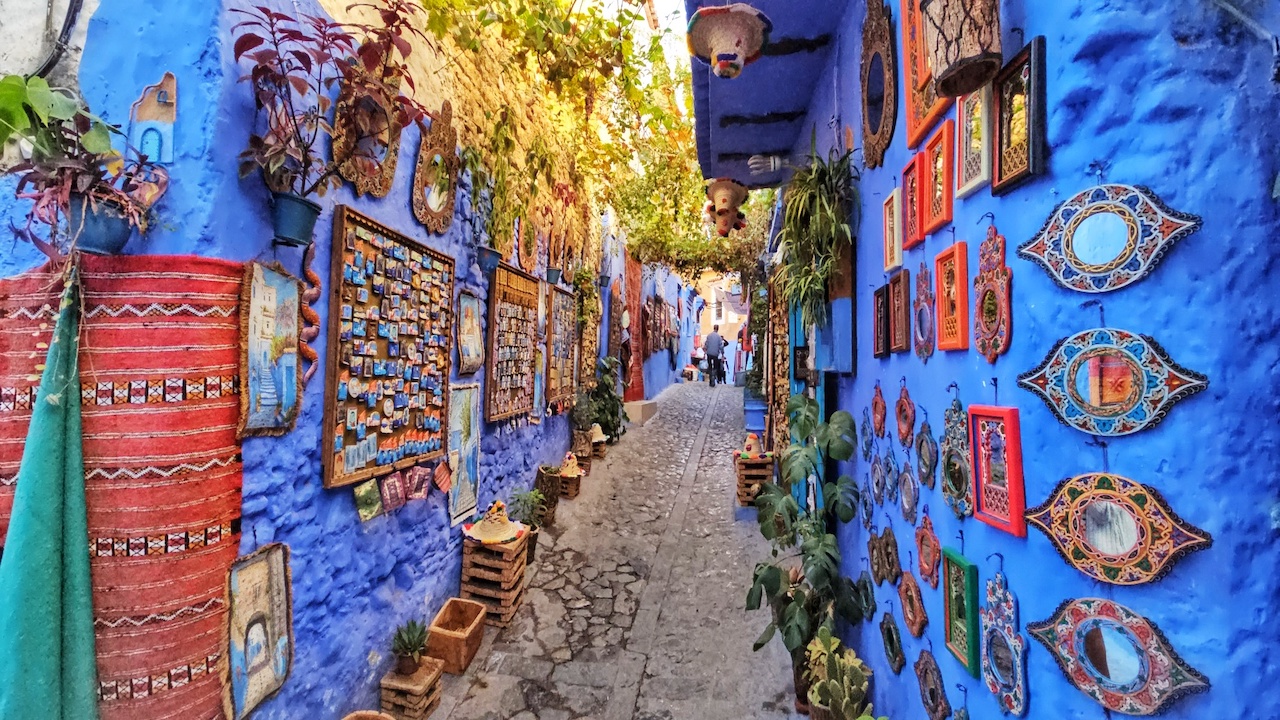
That is a big undertaking. I think you guys have gotten the hang of this now, and seem to have smooth sailing most of the time.
We have been to Morocco 4 times, it’s lovely country with very friendly people.
Our van insurers are saga and they charge £25 for the green card for the 3 months we were there.
If you are taking a dog you must have a blood test done at home to prove they have rabies antibodies and you must have the certificate from your vets to prove it’s been done, a stamp in there passport is not good enough. Its required for reentering Spain if you don’t have it they can put your dog into quarantine.
Sound advice for pet owners Sue. It really is a lovely country, much greener than we anticipated although haven’t been south yet, lol
Thank you very useful information as it’s something we are considering doing at a later date. Have fun and stay safe x
You’re very welcome Sue. Put it on your list. It’s a must
I just arrived in Morocco yesterday. I consulted your post when planning my trip, and had it open on my phone from my arrival in Algeciras until my final exit from Tangier Med. I can’t thank you enough!!
Hi Gerard and Sue, what a great piece of feedback thank you. We’ve got a great ebook we can share with you too. I’ll drop you an email that might be helpful too. We are due over to Morocco next month, so it is great to know that the process is still current. We really appreciate your comment. Kx
Hi Karen
Were looking into travelling to Morocco and you e book and blog is valuable advice that I’m studying. Can you tell me if you’ve got over yet and what the ferry prices are? I searched on the transmediterrean site and it appears to be around €600 return ! Does that seem right ? Hope to get over and maybe see you in travels if your over for a while
Hi Michele glad to hear that the resources have been helpful. We are travelling over next Tuesday/Wednesday although if you go to Carlos in Algeciras you should get prices for the ferry of around €300 for a motorhome and two adults. We’ll give you an update when we cross next week. The co-ords are in the book and blog for Carlos. Just make sure you have cash not credit card. Kx
Hi MR
Very useful. Your info helped get us here safely.
BTW do get yourself a voltage regulator or you may need a new fridge(£2000) Bricoma has them about£50 . Avoid Mr Bricolage as unhelpful and all branches are separate franchises.
You need 2000kVA
Cheers
P & K
Morocco is high on our bucket list but I’d never thought of doing it my motorhome. Lots to think about now!
It was a doddle Lisa. You’ll really enjoy it.
I’m so happy to see you guys heading to Morocco. As you know we’ll be in Spain with our car this summer and we’re thinking of flying to a Morocco for a couple of weeks…we never even considered taking the car with us. So you’ve just opened up a world of opportunities. Plus, I want to meet Carlos 😂 Safe trip guys!
Carlos is legend. So is the A4 handwritten note that says I’m in the Bar next door. lol. We had a great time Nicky
I love how chock full of details this post is! I definitely want to get to Morocco so will be closely following your adventures!
We had a blast Heather and so will you.
Would love to visit Morocco but not sure if I would undertake it in a motor home (or caravan, for that matter)! But that is what adventure is about… Great comprehensive guide and enjoy your travels.
Wouldn’t recommend a caravan as many of the roads are quite rough. Although lots of French Motorhomes have trailers…
I can see plenty of caravans on the campsite Carol. The roads in fairness have been better than the pot holed ones in the UK although we are only in Moulay Boussalham which is in the north. Will update folk as to the road conditions as we head further south but so far no problems.
Thank you for this clear and concise information, certainly helps the anxiety levels.
No worries. Nothing to worry about. Morocco is a great place to visit.
Fascinating read – thank you! Doubt I’ll be able to persuade himself to take our motorhome but I can hope……
Happy travels!
That’s a shame Moir. If you need any persuasive help we are here, lol
Your advice regarding conserving has is OK but the electricity on many campsites is far from adequate. Sometimes barely enough to run the fridge and it can do damage… we have installed a voltage regulator to solve this….
They sometimes claim to give you 6 amps and even if you get this it probably won’t run a kettle etc. Or it may do for a bit and then trip everything.
There is no simple solution for a long trip other than buying a local gas bottle….
Regarding Carlos: his daughters’ now run the business
We didn’t see him in January but he was around last time we booked….
Also you get a complimentary bottle of wine and a cake or biscuits with you ticket…
Tis true, Carlos is looking a bit old and his daughter was behind the counter when we entered. Probably best as I saw a hand written a4 poster blue tacked to the copier which said ‘ I’m in the bar next door’. LOL. In and out in 5 minutes, no hassle. Perfect. Haven’t tried the wine yet.
A common problem across Europe but I can only report that we have used a remoska (800W) external oven on two separate campsites and had no issues so far. We will report a more comprehensive assessment on the state of the electricity supplies in campsites after completing our months trip but for now no issues.
Another thing to add about customs etc is that drones are not allowed in Morocco. They only asked us about them and guns… didn’t check for alcohol… Good thing as we had a load of gin and wine boxes under the floor…
I have never traveled with motorhome and it looks like a lot of preparation is required to go with one. Seems like fun, hope you had a great time there
Still having a great time, Richa. Still here and loving it.
I love how detailed your posts are. I am from Spain and I had no idea you could sail to Morocco from anywhere but Tarifa or Algeciras. And I am shocked you did not have any problems, I have heard that almost anyone who passes by ferry with anything larger than a car is thoroughly registered. I would have thought that arriving with a motorhome would be even more of a problem. HAppy to be wrong!
It couldn’t have been easier Jenn. we had a great time
Interesting read. We travelled in Morocco by train, and then later we rented a car. My neighbours had a campervan throughout Europe and left it in Spain when they went to Morocco. You made the steps really clear, but it still seems a bit of work. We had only handshake deal on our car (I still can’t believe we did that AND it turned out fine.)
I know Rhonda. really easy and we had a great time. Can’t wait to go back.
Very interesting indeed, I am considering spending 3 months in Morocco once we are no longer allowed to be in Schengen for more than 90 days in 180. So this info is valuable. Thanks a lot.
David (travelingvan47)
You’re very welcome David. We are going back for 3 months next year too. See you there, lol
How many camels were you offered for Karen? 😂 Thanks for another great ‘how to’ post. Maroc is on our to do list. We have been before in 2013 but not in a motorhome. Safe travels.
Hi Graham – sadly they didn’t even offer any camels. Perhaps I was just too assertive for them! It is a great country for motorhome travels and let’s hope we will soon all be free to travel there again soon. Karen x
Having been before, I think this post has given us even more reason to go back and explore some more. Thanks, really good post to read.
Hi Mike, that’s great to hear. We shall certainly be returning once things have settled down and the world feels more stable. Thanks for your feedback. Kx
Thanks for the really useful post 🙂 We’re coming as a family with our young children next winter (as long as the ferries are running) – can’t wait!
However, I just spoke to Comfort and they assured me that they can’t cover Morocco anymore 🙁
Will try Saga and others…
Thanks again
…or maybe not as I’m not over 50!
Ah yes will be a restriction. You could of course get third party cover at the port, although we always feel as if that isn’t really enough cover.
Hi Tim, our pleasure. Yes sadly Comfort have withdrawn their cover for Morocco, Turkey and Montenegro which is a deal breaker for us. So sadly we will be departing from them and going with Saga who do provide cover. I believe they are the only ones who do. Good luck with your search and your plans. Karen
Great read, loads of useful tips so thank you. You were recommended to us by a friend and glad we found you. We are also full time van livers and Morocco looks really inviting.
Be safe and maybe see you on the road somewhere.
Hi John thanks so much for your feedback. Glad it’s been so helpful. As you might have read below, Gerard used this blog throughout his arrival into Morocco and got through with no stress. I have also popped link to our free to download eBook as well, which has a lot more information that might be helpful for you. Have a great trip and likewise hope to see you ‘out there’. Karen x
Firstly let me thank you for such an informative blog. We hope to go to Morocco next year. Two questions: we hear of “hassle”, particularly from children for sweets and toys. Is this an issue? Also we have a motorbike in our garage. We are nit planning to use it (lack of insurance?) but presumably it needs to be declared on entry?
Good morning David. Our pleasure, I’m glad it has been helpful. I don’t think I would describe it as hassle. Yes there are children in some areas that stand on the street asking for ‘stilos’ or ‘bon bons’ although you just drive on by. We were given a great piece of advice by a local that we must not give them gifts, unless it is for a whole school or community. If they receive gifts from their begging of a tourist, the advice was that they will become conditioned this way. So as hard as it might be, we must resist giving them what they ask for. So no, we didn’t find it an issue. Regarding your motorbike yes I would declare it. And in fact you might want to get insurance at the border for it as there were a number of times during our month’s tour where we would love to have had a motorbike to get around. I can’t give a definitive about what action to take regarding the bike as we don’t have one, although we have friends about to embark so if I can get an update, I’ll let you know. Kx
Great article thanks. Just a note that LV offer fully comprehensive for Morocco and will issue a green card to that effect. Ours was £58 for 2 months on top of the reasonable annual premium of £260 for a VW California.
Also you need a ‘1968’ international driving permit (IDP) from the Post Office to drive in Morocco.
Safe travels!
Good morning Huw, thank you for the feedback and knowing about LV. We have also found that Sterling Insurance will give you a temporary cover insurance that is comprehensive, although it is an eye-watering £700-900 on top of your annual insurance. Saga also offer comprehensive cover as part of their annual policy although for us as full-timers none of these (except Sterling) are viable. The IDP does seem to be a new requirement since Jan 21 so we have one just yesterday. Kx